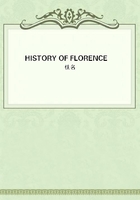
第86章
During the war the malignant humors of the city were in constant activity. Cosmo de' Medici, after the death of Giovanni, engaged more earnestly in public affairs, and conducted himself with more zeal and boldness in regard to his friends than his father had done, so that those who rejoiced at Giovanni's death, finding what the son was likely to become, perceived they had no cause for exultation. Cosmo was one of the most prudent of men; of grave and courteous demeanor, extremely liberal and humane. He never attempted anything against parties, or against rulers, but was bountiful to all; and by the unwearied generosity of his disposition, made himself partisans of all ranks of the citizens. This mode of proceeding increased the difficulties of those who were in the government, and Cosmo himself hoped that by its pursuit he might be able to live in Florence as much respected and as secure as any other citizen; or if the ambition of his adversaries compelled him to adopt a different course, arms and the favor of his friends would enable him to become more so. Averardo de' Medici and Puccio Pucci were greatly instrumental in the establishment of his power; the former by his boldness, the latter by unusual prudence and sagacity, contributed to his aggrandizement.
Indeed the advice of wisdom of Puccio were so highly esteemed, that Cosmo's party was rather distinguished by the name of Puccio than by his own.
By this divided city the enterprise against Lucca was undertaken; and the bitterness of party spirit, instead of being abated, increased.
Although the friends of Cosmo had been in favor of it, many of the adverse faction were sent to assist in the management, as being men of greater influence in the state. Averardo de' Medici and the rest being unable to prevent this, endeavored with all their might to calumniate them; and when any unfavorable circumstance occurred (and there were many), fortune and the exertions of the enemy were never supposed to be the causes, but solely the want of capacity in the commissary. This disposition aggravated the offenses of Astorre Gianni; this excited the indignation of Rinaldo degli Albizzi, and made him resign his commission without leave; this, too, compelled the captain of the people to require the appearance of Giovanni Guicciardini, and from this arose all the other charges which were made against the magistrates and the commissaries. Real evils were magnified, unreal ones feigned, and the true and the false were equally believed by the people, who were almost universally their foes.
All these events and extraordinary modes of proceeding were perfectly known to Niccolo da Uzzano and the other leaders of the party; and they had often consulted together for the purpose of finding a remedy, but without effect; though they were aware of the danger of allowing them to increase, and the great difficulty that would attend any attempt to remove or abate them. Niccolo da Uzzano was the earliest to take offense; and while the war was proceeding without, and these troubles within, Niccolo Barbadoro desirous of inducing him to consent to the ruin of Cosmo, waited upon him at his house; and finding him alone in his study, and very pensive, endeavored, with the best reasons he could advance, to persuade him to agree with Rinaldo on Cosmo's expulsion. Niccolo da Uzzano replied as follows: "It would be better for thee and thy house, as well as for our republic, if thou and those who follow thee in this opinion had beards of silver instead of gold, as is said of thee; for advice proceeding from the hoary head of long experience would be wiser and of greater service to all. It appears to me, that those who talk of driving Cosmo out of Florence would do well to consider what is their strength, and what that of Cosmo. You have named one party, that of the nobility, the other that of the plebeians. If the fact corresponded with the name, the victory would still be most uncertain, and the example of the ancient nobility of this city, who were destroyed by the plebeians, ought rather to impress us with fear than with hope. We have, however, still further cause for apprehension from the division of our party, and the union of our adversaries. In the first place, Neri di Gino and Nerone di Nigi, two of our principal citizens, have never so fully declared their sentiments as to enable us to determine whether they are most our friends our those of our opponents. There are many families, even many houses, divided; many are opposed to us through envy of brothers or relatives. I will recall to your recollection two or three of the most important; you may think of the others at your leisure. Of the sons of Maso degli Albizzi, Luca, from envy of Rinaldo, has thrown himself into their hands. In the house of Guicciardini, of the sons of Luigi, Piero is the enemy of Giovanni and in favor of our adversaries.